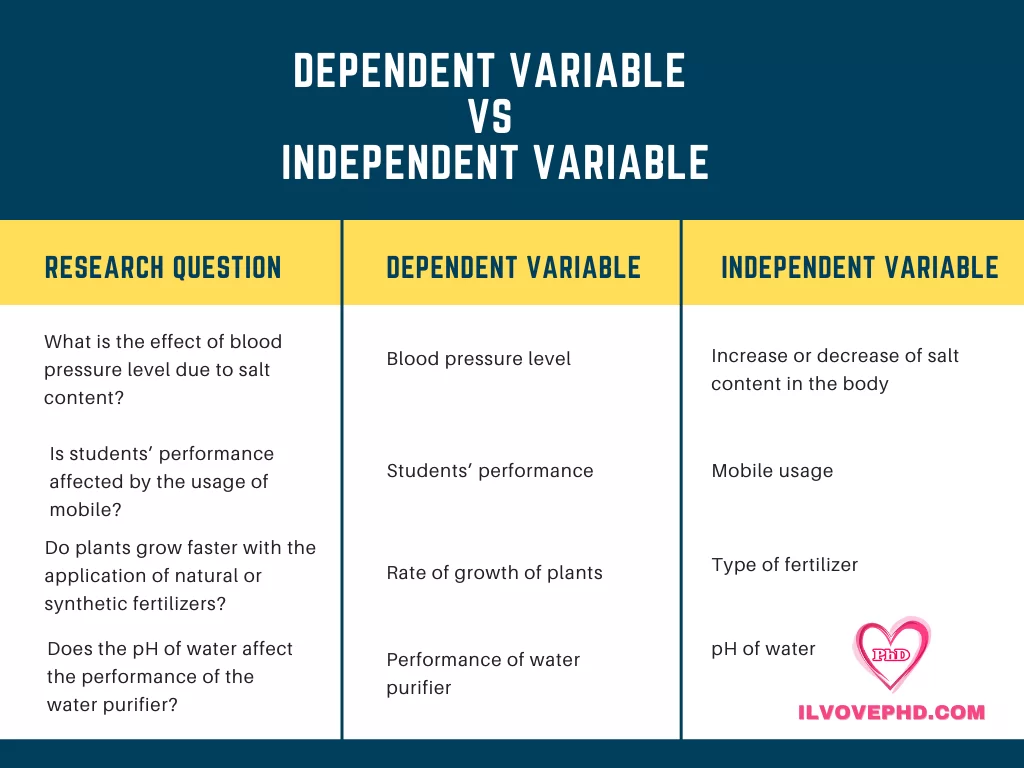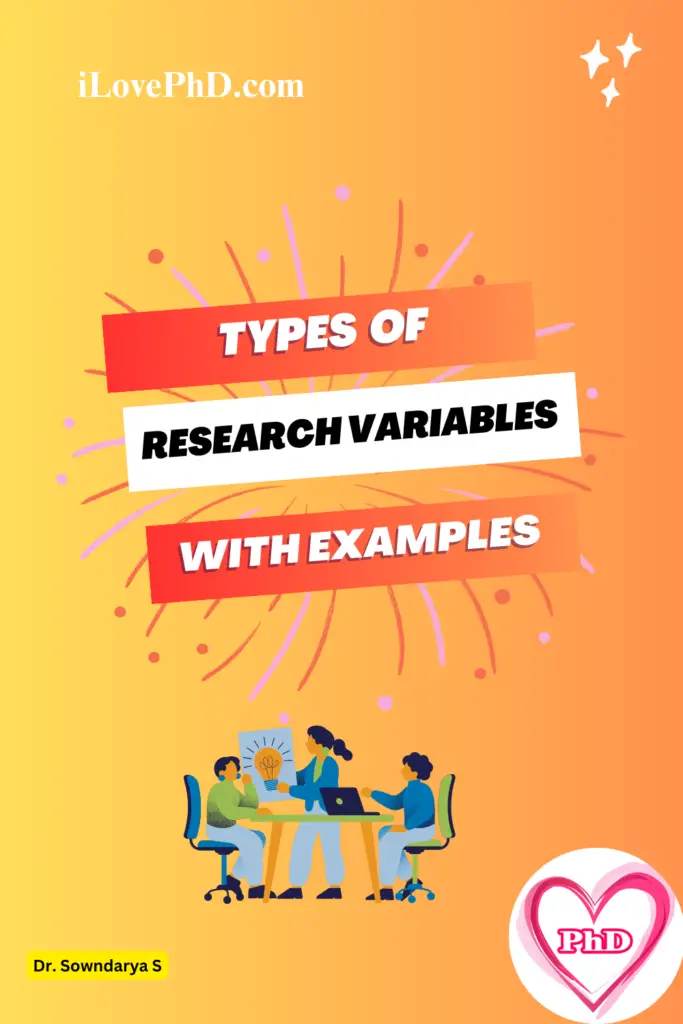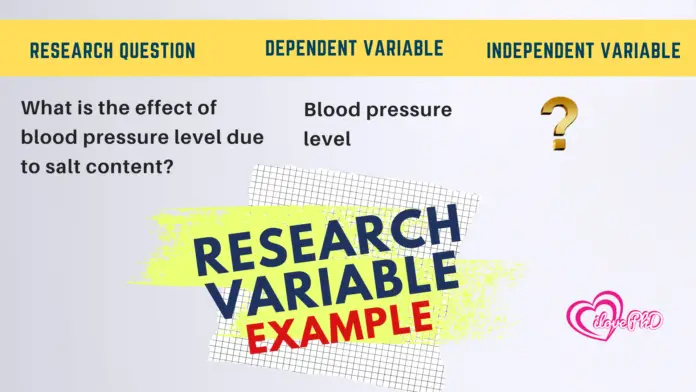The research variable is a quantifying component that may change from time to time. In research, variables are like the building blocks that help us understand relationships between different factors. In this article, iLovePhD explains the main types of variables and what they mean with some real-world examples.
The terms variable and constant refer to changes in statistical patterns of random or real data that can lead to some changes in the resulting state of the system.
In other words, variables are any characteristics that can take on different values namely age, test marks, temperature, pressure, weight, etc.
Types of Research Variables with Examples
There are several types of research variables, including independent variables, dependent variables, and extraneous variables. Here’s an explanation of each type with examples:
- Independent Variables (IV)
- Dependent Variables (DV)
- Control Variables
- Extraneous Variables
- Mediating Variables
- Moderating Variables
Dependent and independent variables are measured during experimental studies to assess the cause-and-effect relationship.
1. What is a Dependent Variable in Research?
A dependent variable is a variable that varies concerning changes in the independent variable. The value of the dependent variable depends on the value of the independent variable. In statistics, dependent variables can be categorized into:
- Response variables (It varies with another variable)
- Outcome variables (It represents the outcome of another variable)
- Left-hand-side variables (It appears on the left-hand side of a regression equation)
The dependent variable is what we measure after varying the independent variable from low to high. This measurement is done to study the effect of the dependent variable on the independent variable by conducting statistical analyses. Based on the results, the degree to which the independent variable variation can be studied.
2. What is an Independent Variable?
An independent variable is a variable that we vary in an experimental study to measure its effects. It is called “independent” as it is not affected by any other variables in the study. Independent variables can be categorized into:
- Explanatory variables (It explains an event or result)
- Predictor variables (It predicts the value of a dependent variable)
- Right-hand-side variables (It appears on the right-hand side of a regression equation).
These terminologies are used in statistics, where we can study the degree to which an independent variable change can predict changes in the dependent variable.
Also Read: What is an Independent Variable? Importance and Examples
Types of independent variables
There are two main types of independent variables.
- The experimental independent variables can be directly varied during the experimental study.
- A subject variable cannot be varied, but it can be used to group research subjects categorically.
The Independent variable is the cause. Its value is independent of other variables.
ilovephd.com
The dependent variable is the effect. Its value is based on the changes in the independent variable.
Example: Independent and dependent variables
You conduct a study to assess whether changes in pressure affect the reactor performance.
Your independent variable is the pressure of the reactor. You can vary the pressure by making it low for 30 minutes and high for another 30 minutes.
Your dependent variable is the performance of the reactor. Now, calculate the performance of the reactor and analyze the change in pressure have an effect on reactor performance.
How to Find Dependent and Independent Variables in Research?
Ascertaining dependent and independent variables can be difficult or tricky while designing research experiments. A dependent variable in one research study can be the independent variable in another study; therefore it’s important to identify the variables while formulating the design of experiments.
Tips to identify dependent variable type:
The following research questions can be used to identify the dependent variable:
- Is this variable calculated as an outcome of the study?
- Is this variable dependent on another variable in the experimental study?
- Is this variable calculated only after other variables are changed?
Tips to identify independent variable type:
The following research questions can be used to identify the independent variable:
- Is this variable controlled or varied as a subject grouping method?
- Does this variable come before the other variable in time?
- Is this variable used to study the effect of another variable?
Dependent and independent variables are used in the experimental and quasi-experimental research study. Some of the research questions and their dependent and independent variables are listed.

The results can be analyzed by generating descriptive statistics and an appropriate statistical test method can be used to test the research hypothesis. The type of test method depends on the type of variable, level of measurement, and number of independent variables. Most often, t-tests or ANOVA tests are used to assess the experimental data.
3. What are Control Variables?
Think of control variables as the things you want to keep constant so they don’t mess up your results. Going back to our studying methods example, let’s say you’re worried that the student’s prior knowledge might affect their scores. To control for this, you might make sure that all the students have similar levels of background knowledge before starting the study. By doing this, you’re preventing any outside factors from sneaking in and affecting your results.
- These are variables that are held constant or controlled to prevent them from confounding the relationship between the independent and dependent variables.
- They help ensure that any observed effects are due to the independent variable and not to other factors.
- Example: In the exercise and weight loss study, controlling for participants’ diet would be important to isolate the effects of exercise on weight loss.
4. What are Extraneous Variables?
These are like the unexpected guests at your research party – they can mess things up if you’re not careful. In our study, extraneous variables could be things like the students’ motivation levels, how much sleep they got the night before the exam, or even their access to study materials. These factors aren’t what we’re studying directly, but they could still influence the results if we’re not mindful of them.
- These are variables other than the independent and dependent variables that may influence the outcome of a study.
- They can introduce error or bias into the results if not controlled.
- Example: In the exercise and weight loss study, extraneous variables could include participants’ metabolism, genetics, or adherence to the exercise regimen.
5. What are Mediating Variables?
Sometimes, there’s a middleman in the relationship between our independent and dependent variables. Let’s say you’re studying the effect of stress on job performance. Coping mechanisms could be a mediating variable – they’re what’s happening in between the stress levels (independent variable) and how well someone does their job (dependent variable). Understanding these mediating variables helps us see the whole picture of what’s going on.
- These are variables that explain the relationship between the independent and dependent variables.
- They provide insight into the underlying mechanisms or processes through which the independent variable affects the dependent variable.
- Example: In a study on the relationship between stress (IV) and health outcomes (DV), coping mechanisms could serve as mediating variables, explaining how stress affects health.
6. What are Moderating Variables?
Finally, moderating variables are like the conditions or factors that can change the strength or direction of the relationship between our independent and dependent variables. For instance, in a study on the effects of exercise on mood, age could be a moderating variable. Maybe exercise has a stronger effect on mood for younger adults compared to older adults. Identifying these moderating variables helps us understand when and for whom our findings might hold.
- These are variables that influence the strength or direction of the relationship between the independent and dependent variables.
- They indicate under what conditions or for whom the relationship holds.
- Example: In a study on the effects of teaching methods (IV) on academic performance (DV), students’ prior knowledge could be a moderating variable, influencing how effective different teaching methods are for different students.
By understanding and considering these different types of variables, researchers can design more accurate studies and draw meaningful conclusions from their findings.
We hope that this article helps you to understand what is research variable and how to identify research variable types for designing experiments.

Hand-Picked Related Articles
Quantitative Vs Qualitative Research
What is Hypothesis in Research? Types, Examples, & Importance

